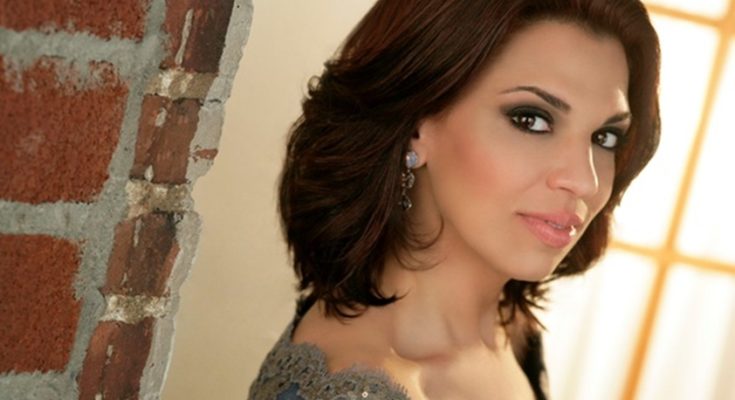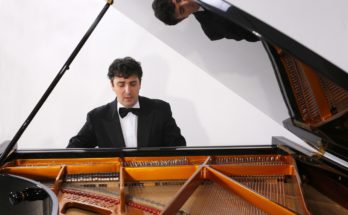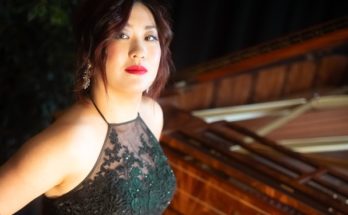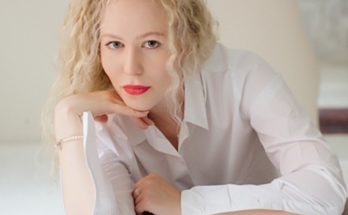PianoMe is used not only by locals, but also by international musicians. One of them is Jessica Rose Cambio. PianoMe caught up with Jessica to talk about what it means to be a musician and also about her current initiatives. We also spoke about her experience of starting her own masterclasses in Berlin and she told us why she likes PianoMe’s idea.
PianoMe (PM): Dear Jessica, thank you very much for your time! It is a great pleasure for us that you are ready for an interview with PianoMe!
Jessica Rose Cambio (JRC): Thanks for interviewing me! I appreciate your interest in my new initiative!
PM: That’s great, thank you! First of all, we would like to briefly introduce you to our readers, even though many of them probably already know who you are. In addition to singing professionally since 2005, you are also part of the prestigious faculty at Berlin Opera Academy, the International Vocal Arts Institute in New York, the Premiere Opera Vocal Arts Institute in Italy, and the Fundación Ibáñez-Atkinson in Chile as both Italian and Voice instructor and have garnered prizes and grants in vocal competitions worldwide from organizations like Richard Tucker, George London, Gerda Lissner, Licia Albanese-Puccini, Giulio Gari, Leiderkranz, and Georg Solti Foundations, Marie Kraja, Leyla Gencer, Loren Zachary Society, Anna Sosenko Assist Trust, and Opera Index. Your previous operatic engagements include Manon in Manon Lescaut with Oper Frankfurt and Theater Erfurt, Alice Ford in Falstaff with Theater Osnabrück and Theater Kiel, Liù in Turandot with Tulsa Opera, Nedda in Pagliacci with New York City Opera and New Orleans Opera, Lucia di Lammermoor in Osnabrück, New Jersey, and Philadelphia, Violeca in La Traviata in more than 5 productions, and over 50 performances of Mimì in La Bohème with Semperoper Dresden, in Francesca Zambello’s production at Royal Albert Hall, in the theaters of Como, Brescia, Pavia, Cremona, Knoxville, Sarasota, in concert with the Los Angeles Philharmonic, and on tour throughout Europe and Asia. You also conduct public Masterclasses, maintain your own private teaching studio, and are the creator and host of OPERINA, an opera podcast for kids, did I forget something? (laughing)
JRC: (laughing) Actually, you got almost everything, but I was also in the Fest ensemble in Theater Erfurt for 2.5 seasons, have moved 25 times all over the world, recently bought a house, and I am a dog mom to a 4 year old Maltipoo named Dante.
PM: That sounds great! Can you please tell us first how you got started getting into music?
JRC: Yes, of course. I actually spent the better part of my childhood thinking that everyone could sing. I played violin for 6 years, but I didn’t think being musical was something special, I thought everyone could do it. I was also very artistic and wanted to study art from a very young age. It wasn’t until high school when my choir director told me I was talented and should probably consider taking voice lessons. He took our choir on a tour of Italy, and it was both magical and life changing for me. I was given a solo, and after one of the concerts in Florence an Englishman came up to me, took my hand, and said, “I’m going to see you sing in La Scala one day, young lady”, and his words struck me like lightning. In that moment I became an opera singer and never looked back. My parents were divorcing at the time and didn’t have extra money to pay for voice lessons, so I didn’t even ask them. Instead I made a deal with my church choir director offering to babysit her small children in exchange for voice lessons, and she agreed and helped me prepare for college auditions.
PM: When did you actually realize that you have such an exceptionally beautiful voice?
JRC: I always sang as a child, as far back as I can remember, but I never actually realized or understood that I was talented until age 14 or 15. I had my heart set on becoming a nun (or an art teacher), but then when I found music I shifted gears entirely and became very serious about singing at age 15. I like to think I dedicated my life to music instead of art or God, but the sacrifice is the same.
PM: Your many experiences have surely shaped you into a multifaceted musician. I am wondering whether the tremendous social changes of recent years — such as the pandemic and wars, along with the resulting flight and displacement — have changed your perspective on opera and musical works.
JRC: Yes, most definitely. Covid affected me tremendously. I had many important contracts taken from me from one day to the next that were simply never replaced. They were also on a much higher level than I had been previously performing, so I know that my career would have gone in a different direction had I been given the opportunity to fulfill them, but the pandemic stole them from me. I was lucky enough to “get stuck” in Germany where they really took care of artists who lost work due to Covid because Italy and the US did no such thing. I also was able to rehearse and sing at least the premiere of Manon Lescaut in Frankfurt (with very strict Covid protocols), but then we went into the second lockdown in November 2020, and I lost the 11 remaining performances. I was also supposed to debut Stiffelio in St. Gallen, and that was canceled entirely. It was devastating to say the least, and it has not been easy for me since. I started my fest contract in Erfurt in 2021, and many things were altered in my original season because of Covid. I did not have an easy time juggling so much varying repertoire simultaneously, and I ended up singing 12 roles in various different Fachs over the 2.5 seasons before deciding to leave my Fest position and return to freelance status. During my Fest I also jumped in a lot for ailing colleagues all over Germany, so I was quite exhausted at the end of 2024 and decided to take a year off of singing to recover from the burnout and focus more on my teaching, learning German, buying a house, raising my puppy, and dealing with some health issues I had been neglecting for many years. I am just now getting back into practicing more and slowly introducing singing back into my life.
PM: Very interesting! From this perspective, do you now see certain opera roles quite differently than you did a few years ago?
JRC: Absolutely. I see everything differently now, actually. Firstly, I will never again say yes to something that I feel isn’t right for me. In Erfurt I was put into a very difficult situation where I had to sing roles whether they were good for me or not, and in the end, I was pushed over my limits. It’s a very long and complicated story, but in a nutshell one of my last assignments was Chrysothemis in Strauss’s Elektra. I knew from the first mention of this opera that it would be too much for me, and it was. I had 3 separate meetings with the theater to try and get out of singing it, but it wasn’t possible, so I had to do it, and I struggled the entire process. The role was not right for me, but I sang it with MY voice: without pushing or over-darkening or falsifying the size of my instrument. This wasn’t an easy feat because I had no support from anyone in the production. The incredibly mean (and rather famous) Italian director treated me horribly during the entire production after I had replaced his wife in La Traviata because she got sick with Covid. The conductor was convinced I didn’t know my music, which was absolutely not true, but instead of helping me, he only made everything harder for me. The orchestra was very loud and at times I felt I was drowning… especially since the director intentionally staged me on the floor for 90% of my role. In fact, a review in Opernglas said, “Jessica Rose Cambio also shone as Chrysothemis in her fashionable polka dot dress, but was almost drowned out by the overly powerful orchestra during the quiet singing passages.” This was the worst musical experience of my career to date, and I have been singing professionally for 20 years. It was indeed after this that I decided to finish out my contract and leave that job permanently. Shortly after my departure the Intendant of 20 years was also forcibly removed by the city of Erfurt because of allegations of sexual assault, abuse of power, and poor management, so I guess I made the right decision.
PM: Since we’re already talking about roles: tragedy, pain, hope – to name just a few qualities – come together in many arias. As a singer, you have to give everything to convey all of that to the audience in just a few minutes, both through your singing and your expression. Does that eventually happen automatically over time, or do you have to practice it anew each time? Can something like that even be learned, or does it only come through experience?
JRC: My idea about how I express myself onstage has changed over the years with simply having more life experience. I used to “act” my arias in an audition or my roles on stage because there was nothing real for me to draw upon, but as I got older, experienced more life, more trauma, and sang more, I eventually felt like I could react spontaneously in the moment to what I was saying or what was being said to me onstage, whilst living through that character. At a certain point, I no longer reacted as Jessica the singer but as Mimi or Violetta or Alice Ford. This was especially true when I did the World Premiere of Nestor Taylor’s Eleni because there were no recordings or preconceived notions about this character and/or how this opera “should” go, so I was able to create it organically as I went. The composer even changed some lines to better suit my voice and my temperament. It was a very new and different (and wonderful!) experience for me to create a role in real-time alongside the living composer as opposed to repeating a role I had already sung so much that had so much emotional baggage, history, and high expectations attached to it. I enjoyed singing Eleni very much, but much more than singing her, I loved BEING Eleni. I think this was actually my besting acting to date because of that freedom to just be myself. The character spoke to me in new ways and reminded me of my grandmother and my own family’s war and immigration story, so it was very easy and fun to create this character and live her through my personal experiences.
PM: And is your approach to your roles more a matter of reproduction, reception, interpretation, or rather reflection?
JRC: I approach every role differently, but I always begin with the text. Regardless of language, the text usually comes first in the composition process, and then the composer writes music to accommodate it accordingly, so my job as an artist is to deliver that text without my singing getting in the way of what I’m communicating. Oftentimes this means studying and learning the language in which the opera is written. I speak Italian, English, German, French, and a bit of Spanish. I also always do extensive research, especially if an opera is derived from a real life story or famous literary work. When I was preparing Manon Lescaut during Lockdown, for example, I created a series on Instagram called “Becoming Manon” where I researched every detail I could find about this character, Puccini, the Epoque and relevant places, and shared the journey with my followers. Without all this knowledge and preparation beforehand, I can’t do the wonderful work of phrasing and shaping my lines and sculpting them with my breath, which only then amplifies and facilitates my singing. They go hand in hand.
PM: Very interesting! How do you see the current role of the teacher in musical education?
JRC: I think the role of the voice teacher is massive, but unfortunately nowadays there are a lot of people teaching voice who have no business teaching voice, especially to young singers. When choosing undergraduate and graduate schools, I was lucky in that my first teacher was very adamant about helping me choose the right teacher and not just simply choosing a school because of the famous name or reputation or even sometimes large scholarship offer. The voice teacher and coach are the most important people on the team of an opera singer, and I want to be that person for my students as well. Good technique can last a lifetime if it’s taught properly, and I want my students to be able to sing for 50+ years without any vocal issues.
PM: By the way, musical education: Apart from your work on the stage, you also have another main focus in your activities – you also conduct public Masterclasses. Right now you are launching new Masterclass series in Berlin. PianoMe is a proud partner of these Masterclasses! As a founder, can you please tell us what makes Cambio Masterclass Berlin especial?
JRC: Yes, I feel I have something very special to offer in my teaching. Because I spent so many years gathering information from world renowned sopranos Renata Scotto, Mirella Freni and Mariella Devia, I have a bank of knowledge that I can offer to my students that is unique from my colleagues. The Belcanto school is something else. It’s more. It’s refined. And I spent 25 years honing that: training my own technique, working on phrasing, breath, intonation, intervals, legato, messa di voce, expression, and coloratura, and now I am teaching all of that to others and it’s infinitely satisfying. Having my educational background in both Italy and the US, however, means I also have double the knowledge accessible to me. Speaking four and a half languages gives me even further expansion into other textual aspects that serve the music, and my own life experiences help me help others get through tough times. I am also slowly realizing in my middle age that I might be a bit Neurospicy, which allows me to work relentlessly and in great detail without ever losing focus or interest or growing tired or bored of the subject matter. (laughing)
PM: Thank you, Jessica. I really like the idea of the Cambio Masterclass Berlin and I’m sure that it is not only me. Do you enjoy doing masterclasses? Why or why not? And what seems to be a common theme that you end up working with students on in masterclasses?
JRC: I love teaching in general, but I especially love it when my students can witness other singers in real-time learning a new technical concept. I find this immensely helpful. In fact, I try to do a studio class once a month for this exact reason, as I am also training them to be teachers themselves one day. As a student of Mirella Freni I had EIGHT voice lessons a week for four years. Not only did I sing my own lessons, but I also had to sit in the room and watch my 12 colleagues’ eight lessons, so I heard the information on rinse and repeat for four years. Because of this, I am able to hear everything a singer does now: when they’re spinning or not spinning the tone, when their tongue or jaw is getting involved, when the air stops flowing, when the larynx is climbing, etc. In fact, the most common theme I have seen among singers (besides being taught the wrong breathing technique) is tongue tension. Because we all speak different languages, learning how to sing an Italian ‘i’ vowel is literally a foreign concept if you don’t speak Italian, and I have come to learn that the ‘i’ vowel is the home base in relation to all the other vowels. But it is formed differently in every language: a Chinese, Russian, Belgian, or Czech singer must also learn how to produce an Italian ‘i’ vowel in the Belcanto school, even if it’s not part of their mother-tongue language. Sometimes this “foreign” concept is difficult to grasp, especially in a standard Masterclass setting.
PM: Have you participated in a masterclass that was particularly memorable or helpful to you?
JRC: I have participated in standard Masterclasses with famous singers or directors who told me their opinion for roughly 20 minutes, and then I never saw them again. The one that stands out in my mind was with Argentinian director Tito Capobianco who literally slapped me across the face at age 18 when I made a grimace about my singing. I don’t find these classes very useful, especially for beginners, nor do I find abusing singers as a teaching strategy useful, albeit memorable. I never participated in an intense weeklong Masterclass like the one I will be holding in February, but I was in both Renata Scotto and Mirella Freni’s Opera Studios which are the source of inspiration for my project. In Italy it’s very common to hold intense, regular lessons within a group setting, and I want to encourage this for my own students.
PM: As a musician, what is your definition of success?
JRC: My definition of success changes every year, every month, every day, every minute. Sometimes I think in order to be considered successful you have to make a million euros a year and be extremely famous. Other times I simply applaud myself for cooking a good meal or cleaning my house or changing my sheets or answering an email. I think it’s all relative, and life must be a healthy balance at all times. My dog has surprisingly helped me with this concept!
PM: By the way, as a musician yourself, you know that the journey is never sweet and easy. What advice would you give to someone hoping to build a career as a musician?
JRC: I would say that if you are also good at something else, to do that as well. It has been considered “tabu” in the past to have another job, but nowadays making a full-time operatic career just isn’t feasible for most singers. That means all of those singers must still continue earning money somehow so they can eat and pay their rent and afford voice lessons and coaching and inflation. My biggest advice: find your best side hustle! What are you good at? Some singer colleagues teach, some are content creators, some clean houses, some are au pairs, some drive Uber, some start fashion clothing lines, some are personal trainers. All of those things are also valid, and if it means you can continue singing and supporting yourself financially, than GO FOR IT!!! The antiquated idea that an opera singer must only live, breathe, eat, and die opera is exactly that: antiquated.
PM: Thank you! I’m really sorry, but I have to ask (laughing). What is your opinion on sharing rehearsal spaces by hosting a rehearsal space on an hourly basis?
JRC: I have loved my time so far using the rooms at the Palast der Künste with PianoMe! I had a lot of trouble last year with my next door neighbors who gave me a problem about the singing in my apartment, even though I built a very expensive soundproof wall between us. Finding this option gave me peace of mind when singing at home became too overwhelming and stressful. It’s not possible to practice in a space where you feel like a prisoner. It’s bad for your mind, your soul, and your voice. So thank you for that freedom!
PM: Finally, what are your aims for the future? Would you like to share any further announcements with our readers?
JRC: My aim is to slowly returning to singing only things that bring me joy and finding a teaching position in a conservatory somewhere in Europe so I can teach, sing a bit, travel to Masterclasses, write my book, see the world, and spend time with my doggy while I’m doing what I love: making music!
PM: Dear Jessica, we thank you for the interview and wish you all the best!
JRC: Thank you so much for the opportunity!
Copyright photo: Kristin Hoebermann




